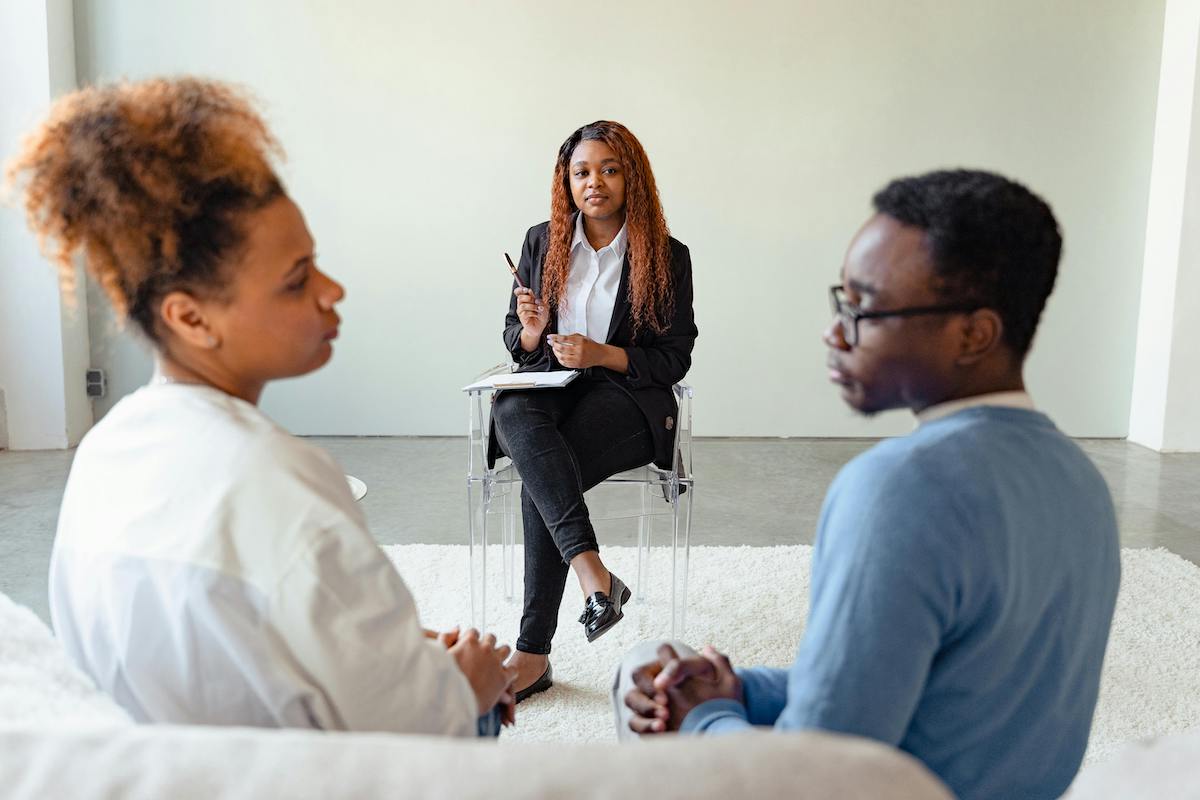Even when your relationship already feels strained and you know you should probably go to therapy, the idea of finding a therapist can feel overwhelming.
You’re already emotionally exhausted, time feels short, and scrolling through endless profiles is probably the last thing you want to do.
But if your relationship is struggling, choosing the right couples therapist is arguably the most important decision you have to make for your relationship and your personal sense of clarity, hope, and emotional safety.
Because while therapy can be life-changing, it only works with the right person.
The good news is that finding the right couples therapist isn’t about luck. It’s about knowing what to look for, asking the right questions, and trusting your instincts.
This guide is meant to help you cut through all the noise and determine exactly how to evaluate therapists, what credentials matter (and which ones don’t), and how to tell if the therapist you’ve chosen is truly a good fit for you and your partner.
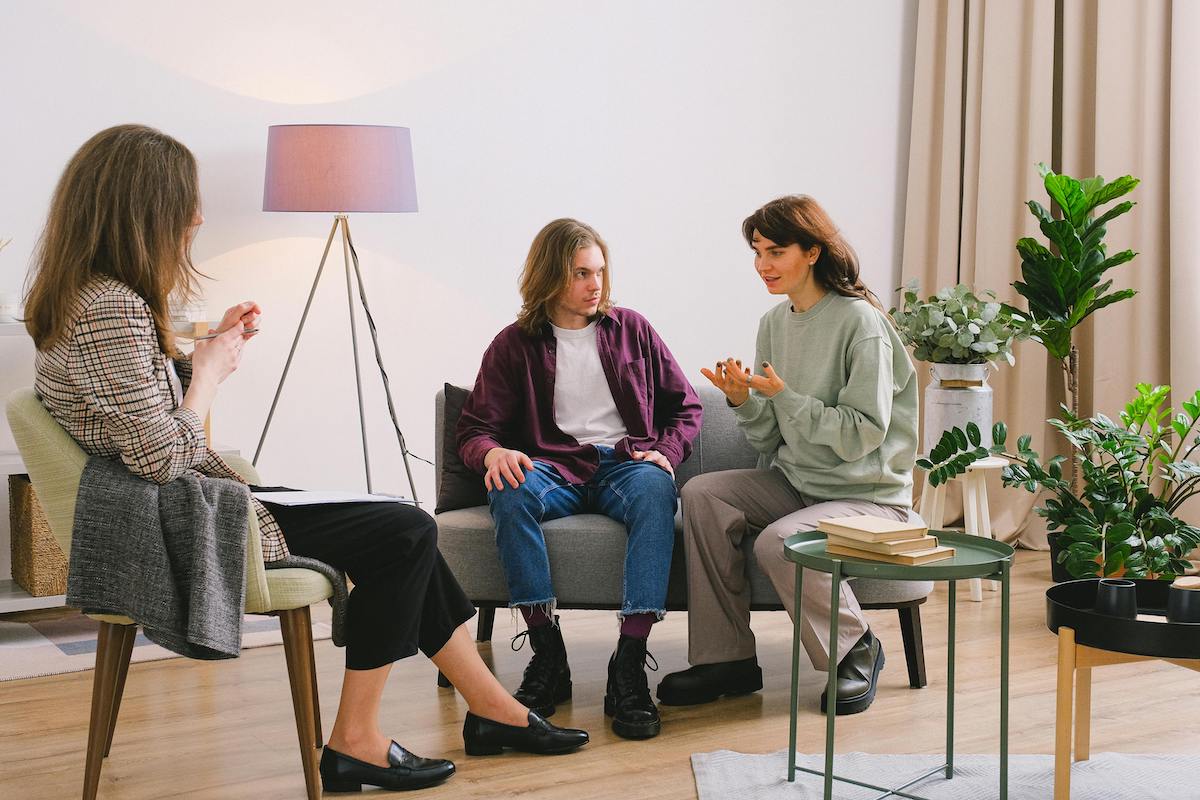
Why the Right Therapist Matters
Couples therapy isn’t just about having someone listen — it’s about having the right person guide you through some of your most vulnerable, painful, and high-stakes conversations.
Research consistently shows that the quality of connection between therapist and client is one of the strongest predictors of success in therapy, sometimes even more than the specific method or training used.
This is clinically called the therapeutic relationship.
So yes, credentials are important (we’ll get to that), but they’re not enough on their own.
“Fit” is more important than credentials alone. Both of you need to feel safe, understood, and respected. But safety doesn’t mean comfort alone. A good therapist will also challenge you by asking hard questions, naming dynamics you may not see in yourself, and refusing to take sides.
Where to Start Your Search
When you’re ready to look for a couples therapist, it helps to understand your options. In the UK, these usually fall into three broad categories: public services, charities, and private therapy.
Public sectors (such as the NHS or local authority services) are often free or low-cost. However, they typically come with long wait times and limited availability. Your GP may be able to refer you to local couples therapy resources, but access can vary widely depending on your area, and the level of specialisation may be limited.
Charitable organisations like Relate specialise in relationship support and often offer a sliding scale for fees. This can be a good middle ground if you’re looking for affordability. While practitioners here may have experience with common relationship issues, they don’t always hold postgraduate training specific to couples therapy.
Private therapy (Couples Intensive) offers the most flexibility in terms of timing, frequency, and specialisation. While it comes at a higher cost, you gain access to therapists who are often trained in advanced modalities and have deep experience with issues like infidelity, trauma, intimacy concerns, or high-conflict dynamics. Many private therapists also offer different formats — from weekly sessions to online appointments to intensive, retreat-style formats.
To start your search, here are some well-regarded directories in the UK:
- Counselling Directory
- Psychology Today UK
- BACP – British Association for Counselling and Psychotherapy
- UKCP – UK Council for Psychotherapy
- AFT – Association for Family Therapy and Systemic Practice
Each of these directories allows you to filter by location, specialisation, and format, helping you narrow down a shortlist that fits both your relationship and your budget.
THINK WE‘D BE A GOOD FIT? BOOK A FREE 20-MINUTE CONSULTATION HEREWhat Credentials Should You Look For?
Although ‘fit’ might be the biggest determining factor of how well therapy works, you still should look for people who have the proper credentials.
Look for someone with specific post-graduate training in couples or relationship therapy.
Some common and respected certifications in the UK include:
- Certificate of Systemic Family Therapy
- Family Therapy Graduate Certificate
- Certificate in Psychosexual and Relationship Therapy:
- Certificate in Couples Counselling
- Certificate in Relational Counselling
*Your therapist does not need to have ALL of these, since many are redundant. But they should have some form of post-graduate couples therapy training.
You might also come across therapists trained in particular approaches. These can give you a sense of how they work. For example, I personally have advanced specialist training in:
- Narrative Therapy
- Humanistic Counselling
- Solution-Focused Brief Therapy
- Relational Psychoanalysis
- Developmental Model
- Gottman Method
- Relational Life Therapy
- Collaborative Couple Therapy
- Sexual Medicine
- Discernment Counselling
- Ericksonian Hypnotherapy
In addition to relevant training, your therapist should also be registered with a professional body. In the UK, the most credible ones include:
- BACP – British Association for Counselling and Psychotherapy
- UKCP – UK Council for Psychotherapy
- AFT – Association for Family Therapy and Systemic Practice
- National Council of Integrative Psychotherapists (UK)
- NCPS- National Counselling and Psychotherapy Society
Registration with one of these organisations ensures your therapist adheres to a professional code of ethics, maintains ongoing training, and is accountable to a regulatory body.
How to Choose a Therapist That Works for Both of You
One of the most common challenges couples face when starting therapy is finding someone who works for both partners. That sense of mutual trust and safety is essential, and it begins with a conversation before you even book a session.
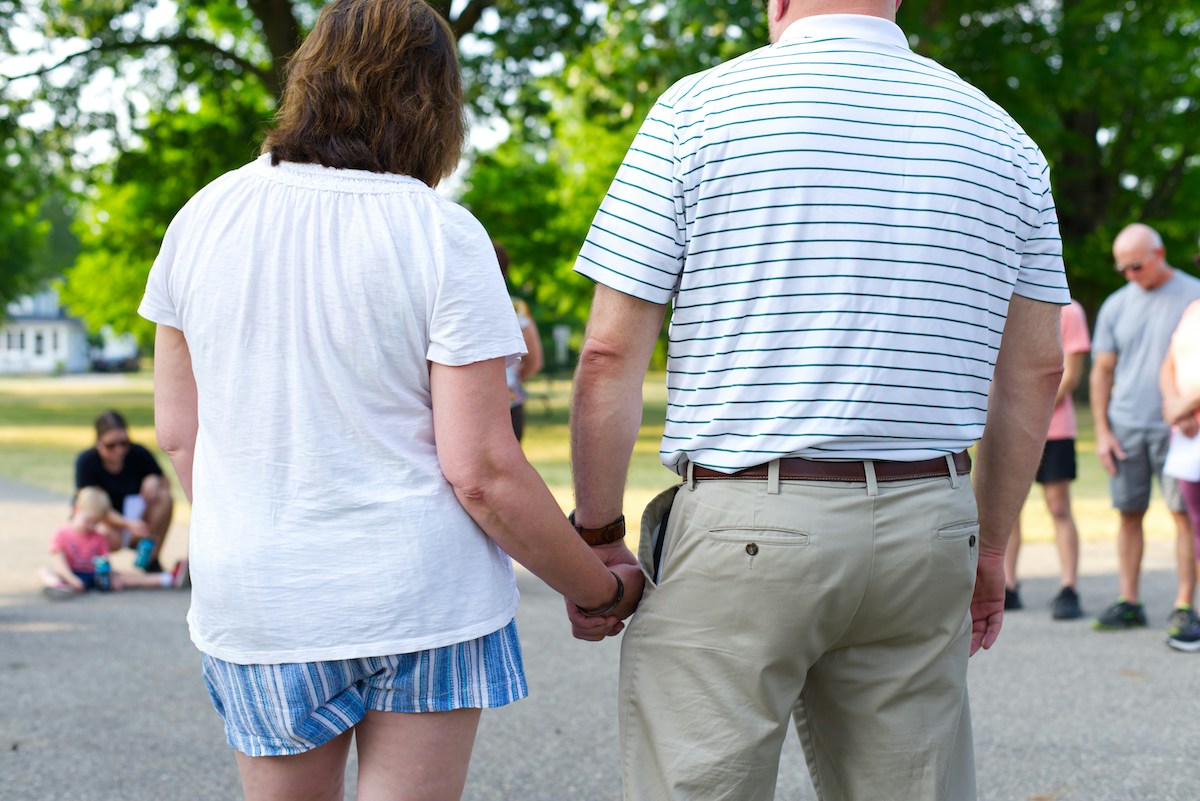
Begin by discussing your preferences and goals together.
What format do you each feel comfortable with — in-person, online, or something more intensive?
Are you both clear on why you’re seeking therapy?
Is the goal to stay together no matter what, or to gain clarity about whether the relationship can or should continue?
It’s also worth considering whether specific dynamics in your relationship require specialist understanding. For example:
Is there a history of trauma that needs to be handled with care?
Are either of you neurodivergent and would benefit from someone who understands that lens?
Are there LGBTQ+ dynamics that require an affirming and experienced therapist?
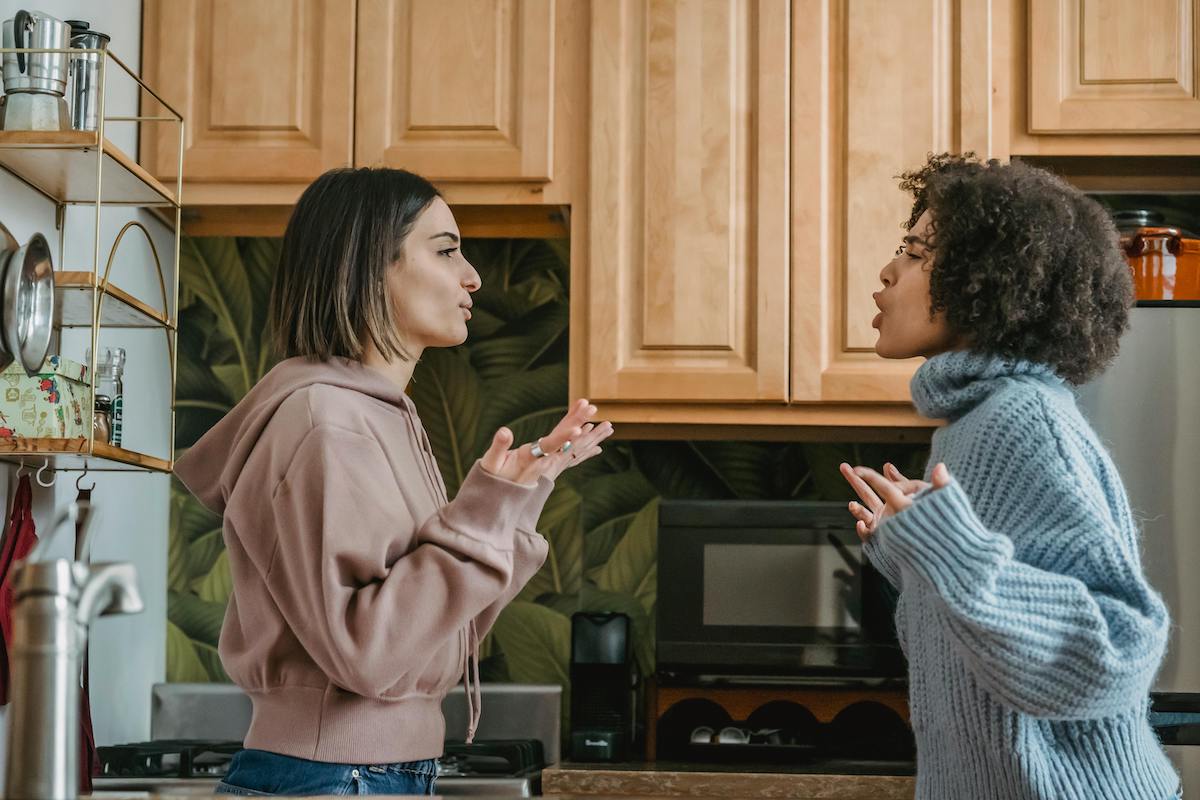
Where possible, try to work with one therapist throughout the process.
Even if you have individual sessions as part of the work, having a shared therapist helps maintain continuity and avoids mixed messages. This person should be skilled in keeping both of you engaged, seen, and challenged equally.
Ultimately, the right therapist isn’t just someone who’s “nice.” It’s someone who can hold your relationship with clarity, balance, and skill — someone who will support you and stretch you toward growth. That’s when you will find therapy truly beneficial.
Questions to Ask Before Booking
You may still be deciding if you even need therapy. Or you’re both committed to finding a therapist.
Before you commit to working with a couples therapist, it’s worth asking a few thoughtful questions — either by email or during a short discovery call.
A good therapist will welcome these inquiries and answer them openly.
Here are a few helpful questions to consider:
Do you specialise in couples therapy? – Many therapists work mostly with individuals and only see couples occasionally. Ideally, you want someone who has specific training in relationship dynamics and regularly works with couples.
What kind of training or model do you use? – You’re not just looking for someone who’s kind—you’re looking for someone with a solid therapeutic framework. Whether it’s EFT, the Gottman Method, or something else, they should be able to explain their approach and why it’s effective.
Have you worked with couples like us before? – If your relationship includes unique dynamics (like neurodivergence, trauma, infidelity, or being part of the LGBTQ+ community), ask directly about the therapist’s experience.
How do you typically structure sessions? – Some therapists are very structured and directive, while others are more reflective and client-led. There’s no right answer, but knowing what to expect can help you decide if it fits your needs.
These questions are about more than just gathering information. They’re about getting a feel for the therapist’s confidence, clarity, and responsiveness. You should feel like they’re listening to you, not just pitching a service.
Red flags to watch for
Just like it’s important to spot red flags in a relationship, you should also be on the lookout with your therapist. Trust your instincts here. If something feels off during that initial exchange, it’s worth pausing before moving forward.
- Vague or evasive answers
- Lack of specific experience with couples
- A dismissive attitude toward your concerns
- A rigid, one-size-fits-all structure
What to Expect in the First Few Sessions
Even with a great therapist, the first few sessions can feel uncertain. That’s normal.
Therapy often starts with a mix of hope, hesitation, and emotional intensity. You’re opening up long-held frustrations or fears, sometimes for the first time. So don’t expect instant ease, but pay attention to the process.
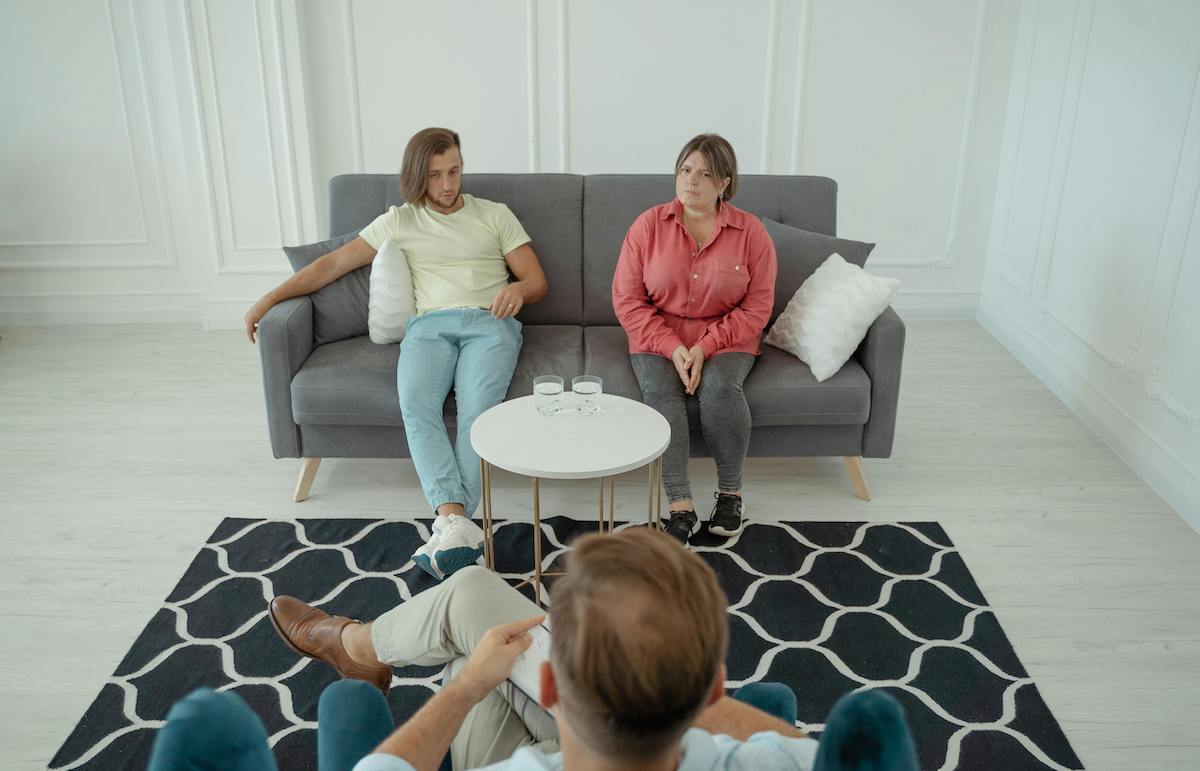
Getting a clear sense of fit usually takes 2 -3 sessions.
During this time, the therapist is learning about your dynamic, your history, and your goals — and you’re learning how they work, how they manage conflict in the room, and whether you both feel seen.
Signs it’s a good fit:
- You both feel heard, not just one of you
- The therapist balances empathy with honest reflection
- Sessions have structure and direction, even when complex topics arise
- You leave feeling challenged but grounded, not more divided
Signs it may not be a good fit:
- The therapist takes sides or seems to align more with one partner
- They avoid hard topics or allow one partner to dominate
- Sessions feel passive, aimless, or chaotic
- You leave feeling more confused or disconnected than when you arrived
If something feels off, bring it up. A skilled therapist will be open to that conversation, and if it’s truly not the right fit, it’s okay to keep looking. The goal isn’t to settle; it’s to find someone who can genuinely help you move forward.
Let’s Talk
Finding the right couples therapist isn’t always easy, especially when emotions are high and time feels short. But it’s worth it.
Taking the time to find someone who’s qualified, experienced, and a good fit for both of you can make all the difference in whether therapy feels productive, safe, and truly transformative.
You don’t have to figure it all out alone.
If you’re ready to take the next step, I offer a complimentary consultation to discuss your goals, answer your questions, and help you decide whether this kind of work is right for you.
Book a free 20-minute consultation with me, or feel free to explore trusted directories like Counselling Directory or BACP to begin your search.
Whether you work with me or someone else, I hope you find the clarity, connection, and support you need to move forward.
